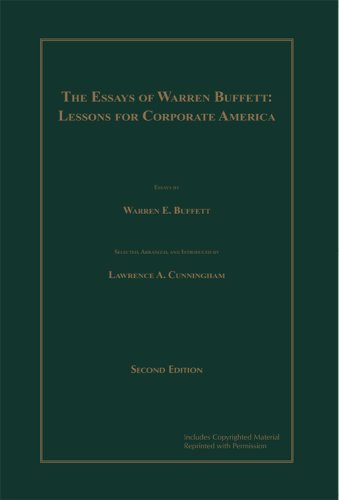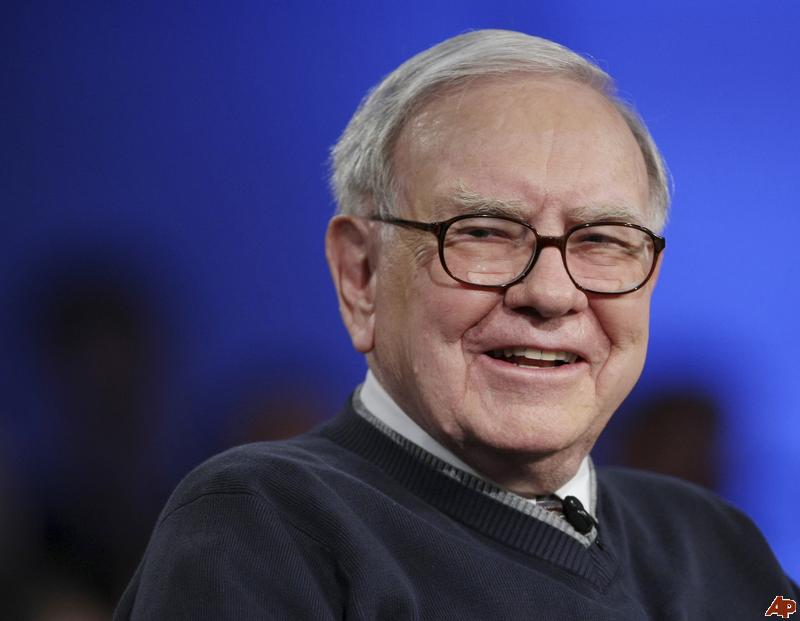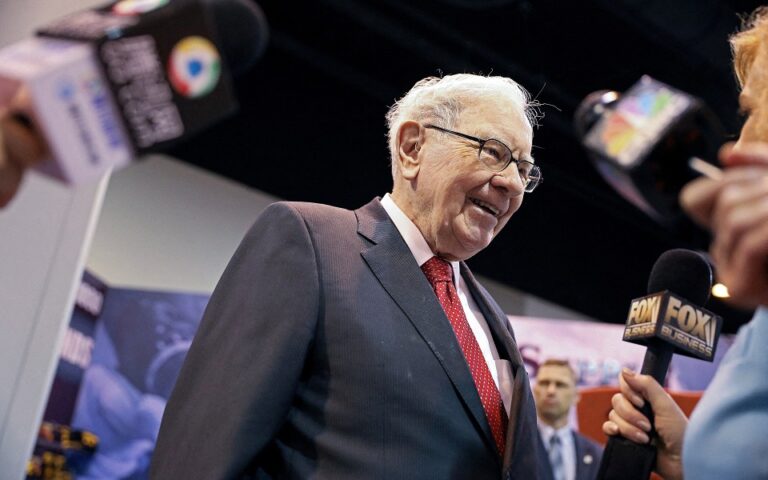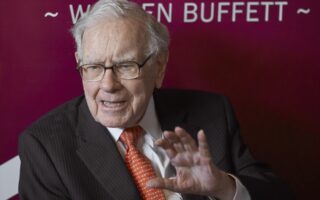bobmorris.biz
Blogging on business, the essays of warren buffett (8th edition): a book review by bob morris.

NOTE: For reasons perhaps known only to Amazon, reviews of all three prior editions of Buffett’s essays/letters are also included with reviews of a “new (Fourth) edition”! Therefore, I have no choice but to add it to my reviews of earlier editions. Here we go again.
This edition has been designated as the EIGHTH, although the previous one was called the FIFTH (?), to correct for the fact that the two early editions were published without corresponding ordinal designations.
Since 1995, Lawrence Cunningham has updated each edition. The remarks that immediately follow comprise my review of the latest edition that has just been published.
These essays can be viewed in several different ways but I think they achieve several different but [begin italics] interdependent [end itaics} objectives:
o They are yearly “state of our company” updates provided by Warren Buffett at annual meetings of Berkshire Hathaway shareholders
o They affirm (or reaffirm business principles and human values to which Buffett remains steadfastly committed.
o They celebrate the company’s achievements since his last update.
o They review errors of judgment and miscalculations he duly acknowledges that he deems noteworthy.
o When appropriate, they provide reassurances (e.g. his health and commitment.
o Together, they provide business knowledge and wisdom of incalculable value to those now preparing for a career in business or are now engaged in one. The style and substance are incomparable. So is Cunningham in terms of his consummate skills as an editor. The essays are clustered in a traditional system of classification:
I. GOVERNANCE AND MANAGEMENT (10 essays) II. INVESTING (8) III. COMMON STOCK (7) IV. ALTERNATIVES (8) V. ACQUISITIONS (6) VI. VALUATION (6) VII. ACCOUNTING (7) VIII. TAXATION (3) IX. AMERICAN HISTORY (3) X. CODA (4)
Of special interest to me is Buffett’s response — in the last essay — to a concern that many Berkshire shareholders have had in recent years: “What will happen if he begins to fade and, if so, how will the board handle it?” His reassurance is that the board will — as always — “do what’s right for the shareholders.”
Buffett has asserted that”If I were to pick one book to read, this would be the one.” That is high praise indeed, given the fact that — for decades — he has devoted at least 30% of his time and often more to reading.
____________________________________________________________________________________________________________________________________
There are several people I wish to thank for increasing substantially my understanding and appreciation of fundamental business principles. I am not – and never have been – an investor in stocks and bonds but have learned so much of value from the material Benjamin Graham provides in The Intelligent Investor: The Definitive Book on Value Investing. A Book of Practical Counsel (Revised Edition). Warren Buffet is next, one of Graham’s students and later an associate. I have read all four editions of his essays (i.e. his letters to Berkshire-Hathaway shareholders), edited by Lawrence Cunningham whose introductions are exceptionally informative as well as eloquent. I am grateful to Carol Loomis for her entertaining as well as insightful book, Tap Dancing to Work: Warren Buffett on Practically Everything, 1966-2013. Tho there sources I now add Jeremy Miller’s Warren Buffett’s Ground Rules: Words of Wisdom from the Partnership Letters of the World’s Greatest Investor.
According to Cunningham in his Preface to the FOURTH Edition, “The year 2015 marks the fiftieth anniversary of Berkshire Hathaway under Warren Buffet’s leadership, a milestone worth commemorating…As in previous editions of The Essays, this one retain the architecture and philosophy of the original edition but adds selections from Warren’s most recent shareholder letters, including his fiftieth anniversary retrospective [please see pages 287-299]. All the letters are woven together into a fabric that reads as a complete and coherent narrative of a sound business and investment philosophy.”
Ben Graham held that price is what you pay and value is what you get. These two issues are rarely identical, but most people who invest rarely notice any difference. With regard his influence, Cunningham observes, “One of Graham’s most profound contributions is a character who lives on Wall Street, Mr. Market. He is your hypothetical business partner who is daily willing to buy your interest in a business or sell you his at prevailing market prices…Another leading prudential legacy from Graham is his margin-of-safety principle. This principle holds that one should not make an investment in a security unless there is sufficient basis for believing that the price being paid is substantially lower than the value being delivered…The circle of competence is the third leg of Graham/Buffett stool of intelligent investing, along with Mr. Market and the margin of safety. This commonsense rule instructs investors to consider investments only concerning the businesses they are capable of understanding with a modicum of effort.”
Somehow Lawrence achieves both convergence and coherence with several dozen of Buffett’s essays, written within a 35-year timeframe (1979-2014). The material does indeed read as “a complete and coherent narrative of a sound business and investment philosophy.” The eleven sections range from Corporate Governance to Berkshire at Fifty and Beyond. Over the years, I have accumulated more than one hundred Warren Buffett quotations and have selected these as indicative of the thrust and flavor of his perspectives.
o The best thing I did was to choose the right heroes. o What we learn from history is that people don’t learn from history o Someone is sitting in the shade today because someone planted a tree a long time ago. o Rule No.1: Never lose money. Rule No.2: Never forget rule No.1. o Chains of habit are too light to be felt until they are too heavy to be broken. o It takes 20 years to build a reputation and five minutes to ruin it. If you think about that, you’ll do things differently. o Only when the tide goes out do you discover who’s been swimming naked. o It’s far better to buy a wonderful company at a fair price than a fair company at a wonderful price. o Wall Street is the only place that people ride to in a Rolls Royce to get advice from those who take the subway. o Somebody once said that in looking for people to hire, you look for three qualities: integrity, intelligence, and energy. And if you don’t have the first, the other two will kill you. You think about it; it’s true. If you hire somebody without [integrity], you really want them to be dumb and lazy.
With regard to other sources, I also highly recommend these: Alice Schroeder’s The Snowball: Warren Buffett and the Business of Life, Roger Lowenstein’s Buffett: The Making of an American Capitalist, and Tren Griffin’s Charlie Munger: The Complete Investor.
This is the Third Edition of an ongoing process by which Warren Buffett presents a “chairman’s letter” (i.e. progress report with his unique reflections) to Berkshire Hathaway shareholders at their annual meeting. Lawrence A. Cunningham edited each of the three editions, with the latest including Buffett’s annual letters to Berkshire shareholders since 2008, the date of the prior edition. Other new material includes:
o The financial crisis and its continuing implications for investors, managers and society; o The housing bubble at the bottom of that crisis o The debt and derivatives excesses that fueled the crisis and how to deal with them o Controlling risk and protecting reputation in corporate governance o Berkshire’s acquisition and operation of Burlington Northern Santa Fe o The role of oversight in heavily regulated industries o Investment possibilities today o Weaknesses of popular option valuation models
Some other material has been rearranged to deepen the themes and lessons that the collection has always produced:
o Buffett’s “owner-related business principles” are in the prologue as a separate subject o Valuation and accounting topics are spread over four instead of two sections and reordered to sharpen their payoff.
According to Cunningham, “Those who are familiar with The Essays will notice that we have made the cover snappier than has been our custom. (Thanks for the cover design to Tim Colton, of Carolina Academic Press, which will continue to partner with me in the distribution of the book.) The main reason: the book’s traditional covers could be seen well in physical form but pictures of them, shown on the internet, could not. Since most sales are done over the Internet these days, the cover needed a face-lift.
“The adage remains, however, that one should not judge a book by its cover. This book should continue to be judged on its content and organization, in which a distinctive investment and business philosophy is coherently articulated. Thanks to the many fans of the book, first published in 1997. I hope you enjoy the updated edition. And I hope to see many of you in Omaha for the Berkshire shareholders’ meeting in May.”
With regard to the Third Edition’s subtitle, “Lessons for Corporate America,” my own opinion is that almost all of the lessons can be of substantial value to leaders in any organization, whatever its size and nature may be. Among Buffett’s most important and yet least appreciated talents is his ability to establish a direct and personal rapport with each person he meets or who reads any of his letters as well as any of his articles such as those included in Carol Loomis’ superb book, Tap Dancing to Work: Warren Buffett on Practically Everything, 1966-2012.
I watched three segments of Buffett and Loomis’ appearances on The Charlie Rose Show and their informal but gracious manner made me feel as if I had been a personal friend of theirs for many years. (I wish I had purchased Berkshire stock 50 years ago!) Credit Cunningham with brilliant editing as well as his own contributions to what continues to be a “moveable feast” of information, insights, wisdom, and wit. Once again, his Introduction (all by itself) is worth much more than the cost of the book as he again discusses with rigor and eloquence what he considers to be key points about Buffett and his leadership of Berkshire Hathaway in recent years.

Share this:
Leave a comment cancel reply.
Notify me of follow-up comments by email.
Notify me of new posts by email.
This site uses Akismet to reduce spam. Learn how your comment data is processed .
- Featured Articles
- Financial Goals
- Financial Advice
- Estate Planning
- Tax Planning
- Credit Cards
- Saving For College
- Financial Calculators
- Finance Book Reviews
- Financial Scams and Fraud
- Financial Coach
- Affiliate Disclosure
- Privacy Policy
- Cookie Policy
- Contact Us Page
Napoleon Hill’s Think and Grow Rich Summary & Review
The top 12 best investing books for beginners in 2024, 6 books like rich dad poor dad you must read..., the simple path to wealth summary & book review (by..., book review of the essays of warren buffett – a summary and analysis.
We are audience supported - when you make a purchase through our site, we may earn an affiliate commission.
Have you ever wondered how a simple book could unlock the secrets of wealth and success? Enter Warren Buffett , the legendary investor, and his insightful collection, “ The Essays of Warren Buffett ” This book, a treasure trove of wisdom, isn’t just a read; it’s a journey into the mind of a financial genius .
And that is exactly why I wanted to write a The Essays of Warren Buffet summary and book review for you
In a world where the stock market seems as unpredictable as the weather, Buffett’s essays offer a beacon of clarity. They’re not just words; they’re a blueprint for financial success. Whether you’re a budding investor or a seasoned pro, these essays are a goldmine of value investing strategies and timeless principles .
But here’s the catch: understanding Buffett’s wisdom isn’t always straightforward. That’s where this article comes in. We’ll look into the essence of Buffett’s teachings, breaking down complex ideas into simple, actionable insights. Think of it as your personal guide to navigating the intricate world of investments , guided by none other than the Oracle of Omaha himself.
“Risk comes from not knowing what you’re doing.” The Essays of Warren Buffett
Ready to unlock the secrets of Buffett’s success? Let’s embark on this financial adventure, where each paragraph brings you closer to mastering the art of investing. Say goodbye to confusion and hello to confidence in your financial decisions.
Key Takeaways: The Essays of Warren Buffett Summary & Review
- At the heart of your quest lies the answer to how Warren Buffett’s timeless wisdom in “ The Essays of Warren Buffett ” can transform your financial journey. While this book provides a roadmap to value investing , it’s more than just investment strategies; it’s about cultivating a mindset for long-term financial success.
- Understanding Value Investing : Delve into the essence of Buffett’s approach, where investing isn’t just about numbers but about understanding a company’s intrinsic value and potential for long-term growth.
- Market Psychology Insights : Buffett’s unique perspective on market psychology, emphasizing emotional resilience and contrarian thinking, offers a fresh lens through which to view investment opportunities.
- Practical Application : Learn how to apply Buffett’s principles in your own investment portfolio, with real-life examples and a step-by-step guide tailored for both novice and seasoned investors.
After these insights, you’re on the brink of unlocking a treasure trove of knowledge. This article will guide you through the intricate world of investments, with Warren Buffett as your compass. Whether you’re looking to refine your investment strategy or seeking inspiration from one of the greatest minds in finance, the journey ahead promises to be enlightening.

Quick Links: Unveiling the Wisdom of Warren Buffett

Warren Buffett: The Oracle of Omaha

Have you ever wondered how a young boy from Omaha transformed into one of the world’s most renowned investment gurus? Warren Buffett’s journey from a paperboy to the chairman of Berkshire Hathaway is not just inspiring but filled with valuable lessons for every investor.
This section first looks into Buffett’s early life, his influences, and his meteoric rise to fame, offering insights into the making of an investment legend.
Buffett’s Investment Journey
Buffett’s investment journey began in his youth, influenced by his father, Howard Buffett, a stockbroker, and later by Benjamin Graham , the father of value investing. His early ventures, from running a pinball machine business to his first stock purchase, laid the foundation for his unique investment philosophy.
Buffett’s approach, blending value investing principles with a deep understanding of market psychology , set him apart from his peers.
Buffett’s story is a testament to the power of perseverance, keen market insight, and the importance of mentorship in shaping a successful investment career. His strategies, emphasizing long-term growth and ethical business practices, resonate strongly in today’s economic trends .
- Did you know Buffett bought his first stock at just 11 years old? Imagine what your financial portfolio could look like if you started investing at that age!
Visual Element Suggestions: A timeline infographic of Warren Buffett’s early life and career milestones.
In summary, Warren Buffett’s early life and influences paint a picture of a determined and savvy investor. His journey to becoming the Oracle of Omaha offers invaluable lessons for anyone looking to navigate the stock market . Next, we’ll explore how Buffett shaped Berkshire Hathaway , turning it into a powerhouse of value investing.
Berkshire Hathaway’s Evolution: How Buffett shaped the company.

Berkshire Hathaway’s transformation under Warren Buffett is a classic example of how visionary leadership can redefine a company’s destiny. From a struggling textile mill to a conglomerate, this section explores how Buffett’s investment acumen and corporate governance reshaped Berkshire Hathaway.
Buffett’s acquisition of Berkshire Hathaway in the 1960s marked the beginning of its metamorphosis. His focus on acquiring companies with strong fundamentals and ethical management practices became the cornerstone of Berkshire’s growth. Under his leadership, the company diversified into insurance, energy, transportation, and more, all while adhering to the principles of value investing .
The evolution of Berkshire Hathaway under Buffett’s stewardship is a prime example of effective corporate governance and strategic diversification. It highlights how economic trends and market dynamics can be navigated successfully with a solid investment philosophy.
- Think about your own investment portfolio. What lessons can you draw from Buffett’s strategy in shaping Berkshire Hathaway?
To conclude, Berkshire Hathaway’s evolution is a testament to Buffett’s investment genius and his commitment to value investing and sound corporate governance . As we turn the page to “The Essays of Warren Buffett,” we’ll uncover the key themes and wisdom that have made Buffett a legend in the investment world.
Book Summary: The Essays of Warren Buffett
“The Essays of Warren Buffett” is more than just a book; it’s a compendium of timeless investment wisdom. In this section, we’ll explore the key themes of value investing , corporate governance , and Buffett’s unique perspective on the stock market and economic trends .
Overview of Key Themes

The book encapsulates Buffett’s philosophy, emphasizing long-term investment strategies, ethical business practices, and understanding market psychology. It advocates for a shareholder-oriented approach in corporate governance and stresses the importance of financial literacy for investors.
These themes are not just theoretical concepts but practical tools for navigating the complexities of the stock market. They align with modern economic trends and offer a roadmap for sustainable investing.
- How do you think applying Buffett’s principles of value investing and corporate governance could change your approach to investing?
Buy a Copy of The Book on Amazon Now!!
In essence, the key themes of Buffett’s book provide a foundation for sound investing and ethical business conduct. Next, we’ll break down these themes chapter by chapter, offering a comprehensive summary of Buffett’s invaluable insights.
“It’s far better to buy a wonderful company at a fair price than a fair company at a wonderful price.” The Essays of Warren Buffett
Deep Dive into Buffett’s Investment Philosophy
Detailed analysis of Buffett’s approach to investing.
Warren Buffett , known for his shrewd investment strategies, has always been a staunch advocate of value investing . This section offers a detailed analysis of Buffett’s approach, revealing the core principles that have guided his successful investment decisions.
Core Principles of Value Investing
At the heart of Buffett’s philosophy lies a focus on long-term investments in undervalued companies with strong fundamentals. He emphasizes the importance of understanding a company’s intrinsic value, rather than getting swayed by market fluctuations. This approach, deeply influenced by Benjamin Graham , advocates for thorough research and patience in investing.
Buffett’s principles of value investing are not just strategies but a mindset shift in how one views the stock market and investment opportunities. These principles are crucial in today’s dynamic economic trends .
- Consider how adopting a long-term perspective in your investments could reshape your financial future. What changes would you make?
In summary, understanding the core principles of Buffett’s value investing approach offers a blueprint for making informed and strategic investment decisions. Next, we explore how Buffett’s views on market psychology contrast with conventional market trends.
TRY AN AUDIBLE TRIAL MEMBERSHIP FOR FREE!!
GET TWO FREE AUDIBOOKS, 30 days for free $14.95 after 30 days and cancel at anytime!! Visit Amazon.com and sign up no – CLICK BELOW
Buffett’s Views on Market Psychology: How Buffett’s strategies defy conventional market trends.
Warren Buffett’s investment strategies often go against the grain of conventional market trends. This section delves into how his understanding of market psychology has played a pivotal role in his investment decisions.
Buffett’s approach to investing is grounded in a deep understanding of human behavior and market sentiment. He often capitalizes on market overreactions, finding value where others see risk. This contrarian approach, focusing on investor psychology rather than just market metrics, sets him apart from other investors.
Buffett’s insights into market psychology are especially relevant in today’s volatile investment climate, where emotional reactions often drive market movements.
- How might your investment choices change if you considered market psychology as much as financial metrics?
Buffett’s unique perspective on market psychology offers valuable lessons in navigating the stock market’s ups and downs. Moving forward, we’ll look at real-life applications of Buffett’s wisdom through case studies and success stories.
“It is not necessary to do extraordinary things to get extraordinary results.”
Case Studies and Success Stories: Practical Application of Buffett’s Wisdom
Real-life examples of applying Buffett’s principles.
The true test of Warren Buffett’s investment principles lies in their application in the real world. This section showcases various case studies and success stories where Buffett’s strategies have been effectively implemented.
From individual investors to large corporations, many have found success by applying Buffett’s value investing principles. These case studies highlight the importance of long-term planning, understanding intrinsic value, and the courage to invest counter to market trends.
These real-life examples demonstrate how Buffett’s investment strategies remain relevant and effective in diverse economic trends and market conditions.
- Imagine applying these principles to your own financial situation. What could your investment portfolio look like in the future?
These case studies not only inspire but also provide practical insights into applying Buffett’s investment wisdom. Next, we offer a step-by-step guide for investors on how to implement these strategies in their own portfolios.
Step-by-Step Guide for Investors: How readers can implement these strategies in their portfolios.
Adopting Warren Buffett’s investment strategies may seem daunting, but it’s achievable with the right guidance. This section provides a practical, step-by-step guide for investors looking to incorporate Buffett’s principles into their investment portfolios.
The guide begins with assessing one’s financial goals and risk tolerance, followed by researching and identifying undervalued stocks with strong fundamentals. It emphasizes the importance of diversification, patience, and staying informed about economic trends and market changes.
Here is a step-by-step guide for investors looking to incorporate Warren Buffett’s investment strategies into their portfolios:
These steps provide a practical guide for investors to implement Warren Buffett’s investment strategies, emphasizing the importance of aligning investments with financial goals, identifying undervalued stocks, diversifying the portfolio, and maintaining a long-term investment approach.
- What’s the first step you’ll take to align your investment strategy with Buffett’s principles?
By following this guide, investors can take actionable steps towards applying Buffett’s investment wisdom to their own financial strategies. As we conclude, remember that mastering personal finance is a journey of informed decisions and continuous learning. Here’s to your financial success and the milestones you’ll achieve!
“If you don’t find a way to make money while you sleep, you will work until you die.”
Comparative Analysis and Critique
Compare and contrast Buffett’s approach with contemporary strategies.
In the world of finance, Warren Buffett’s traditional approach to investing often stands in stark contrast to modern investment theories. This section explores how Buffett’s time-tested strategies compare with contemporary investment methods.
Buffett vs. Modern Investment Theories
Buffett’s value investing, rooted in principles taught by Benjamin Graham , focuses on long-term growth, intrinsic value, and company fundamentals. In contrast, modern investment theories often emphasize technical analysis, market timing, and short-term gains. This comparison highlights the differences in risk tolerance, investment horizon, and market perception between Buffett’s approach and modern methodologies.

Understanding these contrasting investment philosophies is crucial for investors navigating today’s stock market and economic trends .
Which investment approach resonates more with your financial goals and risk appetite?

While Buffett’s approach offers a blueprint for steady, long-term growth, it’s important to also consider the criticisms and limitations of his methods. Next, we delve into a critique and counterpoints of Buffett’s investment philosophy.
Critique and Counterpoints
No investment strategy is without its critics, and Warren Buffett’s value investing is no exception. This section examines the criticisms and limitations of Buffett’s approach to investing.
Critics argue that Buffett’s strategies, while successful in the past, may not be as effective in today’s fast-paced, technology-driven markets. They point to the increasing importance of innovation, market disruptors, and the rapid evolution of industries as potential challenges to the value investing model. Additionally, some argue that Buffett’s success is partly due to his unique position and resources, which may not be replicable for the average investor.
These critiques offer a balanced perspective on Buffett’s investment approach, essential for understanding its applicability in different market conditions and economic trends .
- How do you think Buffett’s strategies could be adapted to address these criticisms?
Understanding these critiques is vital for applying Buffett’s principles in a modern context. Next, we explore the relevance of Buffett’s essays in today’s market, particularly in adapting his principles to current economic trends.
The Relevance of Buffett’s Essays in Today’s Market
In an ever-evolving financial landscape, the applicability of Warren Buffett’s advice is frequently questioned. This section assesses how Buffett’s investment principles can be adapted to align with current economic trends and market conditions.
“The most important investment you can make is in yourself.” The Essays of Warren Buffett
Adapting Principles to Current Economic Trends
How Buffett’s advice holds up in modern financial contexts.
Buffett’s emphasis on fundamentals, intrinsic value, and long-term growth remains relevant, but it requires adaptation to account for new market dynamics, such as technological advancements and global economic shifts. Investors can apply Buffett’s principles by focusing on companies that demonstrate adaptability, sustainability, and strong corporate governance in today’s economy.
- This adaptation ensures that Buffett’s timeless wisdom continues to guide investors through the complexities of modern financial markets.
Consider how you might apply Buffett’s principles to industries that are shaping our future, like renewable energy or technology.
Buffett’s essays remain a valuable resource, but their application requires a nuanced understanding of today’s economic landscape. Finally, we’ll explore the future of value investing and its potential evolution in the coming years.
Similar Books
- The Outsiders by William Thorndike
- The Millionaire Fastlane by MJ DeMarco
As we conclude, remember that mastering personal finance is about taking small, consistent steps towards your goals. From budgeting to investing, each strategy we’ve discussed is a building block for financial stability. My own financial journey, combined with years of advising, highlights the real-life impact of these principles.
Take action today, whether it’s adjusting your budget or exploring new investments. For further guidance, sign up for our newsletter and share your topic suggestions in the comments below. Your engagement helps shape our future content.
As your financial guide, I’m dedicated to providing reliable and practical advice. Look out for our upcoming articles on advanced investment strategies and the latest in personal finance. Together, let’s turn financial challenges into opportunities for growth and success. Remember, every step you take is a step towards shaping a secure financial future.
- Sharing the article with your friends on social media – and like and follow us there as well.
- Sign up for the FREE personal finance newsletter, and never miss anything again.
- Take a look around the site for other articles that you may enjoy.
Note: The content provided in this article is for informational purposes only and should not be considered as financial or legal advice. Consult with a professional advisor or accountant for personalized guidance.
Green Bond Principles & Initiatives: Sustainable Investing Opportunity of a Lifetime
Can you live on $4,000 a month in retirement exploring financial feasibility, how to save money fast 54 insanely effective ways to save money in 2024, taz credit card review: pros, cons, and taz visa alternatives, how can you combine visa gift cards into one visa gift card, how to avoid lifestyle creep: smart strategies for 2024.
- Customer Service Page
A former Financial Planner looking to help more people make their finances easier, with Financial Coaching
Contact Details: [email protected] or (917) 426-2352
Does Chime Have & Work With Zelle? Yes, Let Me Show You How
Vanilla gift card zip code not working find out what to do, 💰 does chime work with cash app learn how to link them and send money.
© 2024 Michaelryanmoney.com. All Rights Reserved.
The Essays of Warren Buffett: Summary & Review

The Essays of Warren Buffett (2023) is a collection of Warren Buffett’s insights on various topics related to investing, management, and corporate governance. Compiled by Lawrence A. Cunningham, this book features a curated selection of Buffett’s famous shareholder letters, organized by theme.
Exec Summary
Only associate with people you like and admire, stick to what you know and understand, as a high-value man, only stick with people you know are great, the best managers think like owners, only do 1-to-many communication 📣, only buy businesses from sellers who love their business, don’t listen to macro-predictions, more wisdom, over-optimism and over-extrapolation of positive trends (nonsense), america supposedly “starting from scratch” in 1776 betrays poor thinking, the “compound interest” story paraded once again….
- Only associate with good characters you like and trust
- Stick to what you understand well , or you’re gambling
- Stop listening to “market predictions” … And predictions in general
FULL SUMMARY
About the Author : Warren Buffett and Charlie Munger are a legendary duo in the world of finance and investing. Buffett, often hailed as the “Oracle of Omaha,” is the chairman and CEO of Berkshire Hathaway, a multinational conglomerate holding company. Charlie Munger is Buffett’s longtime business partner and vice chairman of Berkshire Hathaway. He is known for his straightforward approach to investing and his insightful commentary on business and life. Together, Buffett and Munger have forged one of the most successful partnerships in the history of finance.
This was probably my main takeaway from The Essays.
First off, says Buffett:
After some other mistakes, I learned to go into business only with people whom I like, trust, and admire
That, by itself, will not make you money, he adds. But it decreases the odds you lose money. And it makes life that much easier and better. It’s so important to Buffett, that he’s willing to make less money with that policy:
We intend to continue our practice of working only with people whom we like and admire. This policy not only maximizes our chances for good results, it also ensures us an extraordinarily good time. On the other hand, working with people who cause your stomach to churn seems much like marrying for money—probably a bad idea under any circumstances, but absolute madness if you are already rich.
LOL, not only great wisdom, but also delivered with great humor :).
This is one of the most famous of Buffett’s approaches:
If we have a strength, it is in recognizing when we are operating well within our circle of competence and when we are approaching the perimeter. Predicting the long-term economics of companies that operate in fast-changing industries is simply far beyond our perimeter. If others claim predictive skill in those industries—and seem to have their claims validated by the behavior of the stock market—we neither envy nor emulate them. Instead, we just stick with what we understand. If we stray, we will have done so inadvertently, not because we got restless and substituted hope for rationality.
Buffett says that he and Munger generally stick with people they know and like.
They know there are plenty more great people in the world. But the odds of meeting them are not high enough to make meeting strangers a good use of their time.
Unluckily I lost the bookmark for this passage or I’d love to quote it.
The best managers think like owners in making business decisions. They have shareholder interests at heart.
Because the annual meeting is the time and place for these, Charlie and I are happy to answer them all, no matter how long it takes. (We cannot, however, respond to written or phoned questions at other times of the year; one-person-at-a-time reporting is a poor use of management time in a company with [thousands of] shareholders.)
Buffett says that he wants people who love their business because that guarantees that interest align.
When people love their business, they’ll work hard for it, give it all, and always with a long-term horizon in mind.
That’s why they want businesses with people who are going to keep working on their business. And if they don’t love it, don’t buy.
Says Buffett:
Very simply, we would not want to buy unless we felt key members of present management would stay on as our partners. Contracts cannot guarantee your continued interest; we would simply rely on your word.
And the second part reminds us of how important it is to read characters.
Let them independent
Buffett then lets them free to operate with almost total freedom. They know what’s best for the business.
That allows Buffett to attract the best possible sellers: great businesses with great founders who love their business and will be great long-term managers.
We will continue to ignore political and economic forecasts, which are an expensive distraction for many investors and businessmen.
So… Quit listening to Ray Dalio ‘s predictions of doom and gloom :). He’s been doing that his whole career and his predictions were terrible anyway .
Be suspicious of those who “always make the numbers” (or who promise so)
Charlie and I not only don’t know today what our businesses will earn next year —we don’t even know what they will earn next quarter . We are suspicious of those CEOs who regularly claim they do know the future—and we become downright incredulous if they consistently reach their declared targets. Managers that always promise to “make the numbers” will at some point be tempted to make up the numbers.
Let’s all take steps to reduce global warming
Buffett says that it makes sense to take climate change seriously, and take action.
Even if there is only a 1% chance of disaster, says Buffett, it does make sense to act anyway.
Beware of past-performance “proof”
Beware of past-performance “proofs” in finance: If history books were the key to riches, the Forbes 400 would consist of librarians.
On the blessing of having dumb competition:
what could be more advantageous in an intellectual contest—whether it be bridge, chess, or stock selection—than to have opponents who have been taught that thinking is a waste of energy?
For example:
In the future the U.S. population will move more goods, consume more food, and require more living space than it does now. People will forever exchange what they produce for what others produce. Our country’s businesses will continue to efficiently deliver goods and services wanted by our citizens.
How can you say for sure? During his lifetime, probably yes. But the longer you extrapolate that trend, the more sure you can be it’s gonna be wrong.
America Always Wins Long Terms…
There seems to a general over-confidence on “America”.
Sometimes, even feels a bit overly “patriotic”. For example:
Be clear on one point: In no way does our thinking about currencies rest on doubts about America. We live in an extraordinarily rich country, the product of a system that values market economics, the rule of law and equality of opportunity. Our economy is far and away the strongest in the world and will continue to be . We are lucky to live here.
“Will continue to be”? Same as before, how can he say that? Stretch that prediction on a long enough time horizon, and you can be almost 100% sure it will turn out to be wrong. I’m astonished such a smart person would say such a, how to say it… Non-smart thing.
American business, and consequently a basket of stocks, is virtually certain to be worth far more in the years ahead (…) This powerful trend is certain to continue (…) America golden goose of commerce and innovation will continue to lay more and larger eggs
These are the types of statements that not only leave me scratching my head, but also make me wonder how successful Buffett would have been less rosy historical periods. His over-optimism may have cost him, in those scenarios.
The “future estimates” are all based on trend extrapolation
For example, when he estimates future growth based on the current population growth.
That was so nonsensical to me, that I won’t even spend further time debunking.
From a standing start 240 years ago a span of time less than triple my days on earth Americans (…) starting from scratch America has a mask wealth totally 90 trillion dollars true of course that other
What an ignorant thing to say.
That’s what happens when you focus on investing and read financial reports only, and then talk about history, maybe.
- All the inhabitants erased their brains from all their knowledge in 1776
- All the knowledge accumulated in the millennia past was erased
- All the capital and machinery was destroyed
Of course, the opposite is true. Which is why it was NOT a “standstill” or “start from scratch”.
I even find this take ignorantly insensitive.
The American story is an impressive story. Like all the great empires that have led humanity forward before it, it’s bound to be an impressive story. And we must all be grateful to leading civilizations/countries because leading civilizations pull the world forward. They are givers.
But we’re not going to provide appropriate credit by making shit up.
Or by erasing the contribution of the long history of great men and civilizations that have led us here.
Instead, to be great today, pay respect to past greats.
You know, the:
“if you had invested X dollars in the S&P in the year XXXX, you’d be a multimillionaire by… .”
I’ve never been a fan of those. And … I didn’t expect that from Buffett.
Sometimes tries too hard the “funny quips”
Sometimes it feels Buffett tries a bit too hard to sound smart.
Especially felt off to me when he sought to reference sex.
When such a CEO is encouraged by his advisors to make deals, he responds much as would a teenage boy who is encouraged by his father to have a normal sex life. It’s not a push he needs.
Woody Allen, in another context, pointed out the advantage of open-mindedness: “I can’t understand why more people aren’t bi-sexual because it doubles your chances for a date on Saturday night.”
To me, it felt almost as if he wanted to remind us that he’s not always been a geekier financial analyst.
Bit of bragging
Covert bragging , mostly.
Some outdated stuff
Since the letters sometimes refer to then-contemporary events, it’s bound to have several outdated sections.
Such as against American’s poor balance of payments, Wall Street greed/mistakes, etc.
All about money (through investments). Is that even a good life?
This is just me, but… I was hoping for more life-wisdom.
And, if about money, I’m more interested in entrepreneurship.
All this returns talk even felt tacky to me and not a good way to live. There is more to life than returns and stocks.
The Essays of Warren Buffett is a good book if you’re interested in Berkshire and Buffett’s approach to investing. And it’s a poor use of your time if you’re looking for wisdom outside of investment .
I was looking for more wisdom on “how to live”, let’s say. There are some fantastic golden nuggets, like the ones listed in this review. But overall, The Essays of Warren Buffett is mostly about investments and Berkshire.
It just wasn’t the ideal book for me. But it may be great for you.
Check the best books to read or get this book on Amazon .
About The Author
Lucio Buffalmano
Related posts.

The New Rules of Work: Summary & Review

Words That Sell: Summary & Review

The Slight Edge: Summary & Review
Username or Email Address
Remember Me


The Essays of Warren Buffett
Lawrence cunningham & warren buffett, recommended by, book reviews.
Patrick O'Shaughnessy: "Buffet is one of the best writers in the history of investing; his mastery of the analogy as a means to explain complex concepts is without parallel.
I’ve read every one of his shareholder letters cover to cover, but this sequential compilation by Lawrence Cunningham is the best way to read Buffett’s endless points of wisdom."
One of the books Bill Ackman asked his newly-hired analyst to read before joining Pershing Square.
Book Summary
The fifth edition of The Essays of Warren Buffett: Lessons for Corporate America continues a 25-year tradition of collating Warren Buffett's philosophy in a historic collaboration between Mr. Buffett and Prof. Lawrence Cunningham.
As the book Buffett autographs most, its popularity and longevity attest to the widespread appetite for this unique compilation of Mr. Buffett s thoughts that is at once comprehensive, non-repetitive, and digestible.
New and experienced readers alike will gain an invaluable informal education by perusing this classic arrangement of Mr. Buffett's best writings.
Explore Other Book Recommendations
This site uses cookies to store information on your computer. Some are essential to make our site work; others help us improve the user experience. By using the site, you consent to the placement of these cookies. Read our privacy policy to learn more.
- Bookshelf Review
The Essays of Warren Buffett: Lessons for Investors and Managers, Third Edition
by Warren E. Buffett and edited by Lawrence A. Cunningham
John Wiley & Sons Ltd., 2009, 328 pp.
Every year, Warren Buffett, CEO of Berkshire Hathaway Inc., writes a letter to shareholders reviewing annual operating and investment performance. In these letters, Buffett thoroughly discusses his investment philosophies and beliefs. Professor Lawrence A. Cunningham, Henry St. George Tucker III Research Professor of Law at George Washington University, has organized these letters into a book of essays. They are organized topically according to corporate governance, corporate finance and investing, common stock, mergers and acquisitions, accounting and valuation, and accounting policy and tax matters.
Although many authors have written about Buffett’s strategies, this book is written by Buffett himself. The essays illustrate his true investment philosophies without distortion. Moreover, the book is a fun read. In addition to being a successful investor, Buffett is a good writer with a strong sense of humor. He provides funny analogies and lively examples to express ideas. For example, the book defines the “Cigar butt approach to investing” as follows: “If you buy a stock at sufficiently low price, there will usually be some hiccup in the fortunes of the business that gives you a chance to unload at a decent profit, even though the long-term performance of the business may be terrible. (This is like) a cigar butt found on the street that has only one puff left in it[. It] may not offer much of a smoke, but the bargain purchase will make that puff all profit.” (1989 annual letter)
Overall, Cunningham does an excellent job organizing the essays in a manner that allows readers to follow Buffett’s thoughts efficiently. For those interested in learning the inside approach to Buffett’s investment strategies, this book is a must read.
By Antonio Wong , Ph.D., CFA, lecturer of finance, The Hong Kong Polytechnic University
Where to find June’s flipbook issue

The Journal of Accountancy is now completely digital.
SPONSORED REPORT
Manage the talent, hand off the HR headaches
Recruiting. Onboarding. Payroll administration. Compliance. Benefits management. These are just a few of the HR functions accounting firms must provide to stay competitive in the talent game.
FEATURED ARTICLE
2023 tax software survey
CPAs assess how their return preparation products performed.
The Essays of Warren Buffett: Review, Quotes & Lessons

Photo: Amazon
We would like to share with you one of our favorite books – The Essays of Warren Buffett . This book is a collection of wisdom pulled from Berkshire Hathaway’s annual letters from 1979 through 2006.
We would be understating the case to say that these letters have had a large impact on how we think about investing. While the Euclidean approach involves taking a view of what 50 years of company fundamentals can teach us about evaluating companies as potential investments, our findings have both validated and received context from many of the ideas found here.
As we know you are busy and may not have time to digest this book in its entirety, please consider finding time to review a few of our favorite sections, which we have highlighted below.
1) Mr. Market & Market Fluctuations
Buffett's discussion of Benjamin Graham’s Mr. Market, and the mental attitude toward market fluctuations that is most conducive to market success.
“So smile when you read a headline that says 'Investors lose as market falls.' Edit it in your mind to 'Disinvestors lose as market falls—but investors gain.' Though writers often forget this truism, there is a buyer for every seller and what hurts one necessarily helps the other."
{pages 77-81 | 1997 chairman's letter }, 2) growth vs value.
Buffett's perspectives that the industry’s distinction between ‘growth’ and ‘value’ investing is misguided, that growth is simply a component in the calculation of value, and that the term ‘value investing’ is redundant as what is investing if its is not the act of seeking value at least sufficient to justify the amount paid?
"In our opinion, the two approaches are joined at the hip: Growth is always a component in the calculation of value, constituting a variable whose importance can range from negligible to enormous and whose impact can be negative as well as positive."
{page 100 | 1992 chairman's letter }, 3) valuing a business.
Buffett's skepticism of the need to understand beta, efficient markets, modern portfolio theory and other concepts heralded by the investment community and, instead, his guidance to focus on simply how to a value business and think about market prices.
"Your goal as an investor should simply be to purchase, at a rational price, a part interest in an easily-understandable business whose earnings are virtually certain to be materially higher five, ten, and twenty years from now."
{page 108 | 1996 chairman's letter }, 4) predictions.
Buffett's perspective that it is not worth trying to predict market fluctuations and, rather, to focus on being fearful when others are greedy and greedy only when others are fearful.
" 'I can calculate the movement of the stars, but not the madness of men.' .. - Sir Isaac Newton."
{pages 157-160 | 2005 chairman's letter }, 5) owner earnings & accounting principles.
While the pages here perhaps require a few attempts to fully digest, this section contains the most important insights in the entire book. It highlights the limitations of GAAP accounting in investment analysis. It also describes Buffett’s concept of Owner Earnings – that is, the amount of money a full owner of a business could expect to pocket from that business over time – as the relevant item to estimate when making investment decisions.
"Questioning GAAP figures may seem impious to some. After all, what are we paying the accountants for if it is not to deliver us the "truth" about our business. But the accountant's job is to record, not to evaluate... Managers and owners need to remember that accounting is but an aid to business thinking, never a substitute for it."
{pages 225-231 | 1986 chairman's letter }.

6) Asset Valuation {Page 243}
His assessment of the oracle Aesop's famed adage, as the basis for explaining the formula for valuing all assets that are purchased for gain.
"His enduring, although somewhat incomplete, investment insight was 'A bird in the hand is worth two in the bush.' ... Aesop's investment axiom, thus expanded and turned into dollars, is immutable."
{page 243 | 2000 chairman's letter }, 7) forecasts & behavioral bias.
Here Buffett extols the merits of ignoring political and economic forecasts and makes the comment, “we have usually made our best purchases when apprehension about some macro event were at a peak.”
"Fear is the foe of the faddest, but the friend of the fundamentalist. A different set of major shocks is sure to occur in the next 30 years. We will neither try to predict these nor to profit from them. "
{page 274 | 1994 chairman's letter }.
We hope you enjoy this book.
Best Regards,
John & Mike
Additional resources on The Essays of Warren Buffett
What Investment - The one Warren Buffett book you need to read
The Motley Fool - Through the Years: Constant Themes in Buffett's Letters (video)
The Motley Fool - A Money-Making Lesson Buffett Wishes He Learned Sooner
Other Best of Buffett resources:
The SuperInvestors of Graham & Doddsville
How Inflation Swindles the Equity Investor
25IQ - Best Warren Buffett quotes, by topic

Photo: WarrenBuffettStrategies.com
Learn more about Euclidean Technologies

The Essays of Warren Buffett: A Complete Book Summary
- Books and Resources , Investing 101
- Andy Shuler
- March 17, 2020
I feel like I’ve been reading the Essays of Warren Buffett for literally a lifetime, and although it hasn’t nearly need that long, it does feel like I’ve obtained a lifetime of information from his book.

Looking back at some of the previous summaries that I have written, Buffett does an amazing job of making sure that he starts off with a great foundation for the new investor and then by the end of the book, things are moving along at 70MPH on the highway so you better buckle up!
That might seem intimidating, but it shouldn’t. It should actually make you happier that you might not understand it all because the that just means that it will be able to provide value to you now, and in the future, as your investing career continues.
Like I said – I’ve written quite a few different summaries on a lot of these chapters, and I’ve even skipped some really good ones so I wasn’t essentially rewriting the book, but I’ve narrowed my list down to my Top 5 chapters in The Essays of Warren Buffett for our beginner investor:
Defining Intelligent Investing According to Warren Buffett
Buffett’s big investment philosophy is that we should be looking for companies that can drastically change their value for the long-term, not just looking for some sort of short-term gain. Don’t buy a company and then sell it when it goes up 10% – look for that stock that’s going to become a tenbagger!
This is the exact reason why they don’t usually invest in tech companies because the future is so uncertain in terms of what will be a competitive advantage for those tech companies, and he lives by the saying “if you aren’t willing to own a stock for 10 years, don’t even think about owning it for 10 minutes.”
In summary, Buffett said that if you want to be a successful, average investor, you need to focus on two things:
- Find out how to value a business
- Understand how to think about market prices
If you can successfully do both of these then you’re going to be poised for long-term success during your time investing in the stock market. It’s very important for you to understand first and foremost what you think a company is worth, and while this might seem hard to do, you can do so by understanding the financial ratios of the company and their potential path forward.
I know that many people will likely get stressed or overwhelmed by me saying you need to “understand the financial ratios of the company” and I totally understand that, but that’s exactly why Andrew created the Value Trap Indicator to help get you the information that you need without having to be as in the weeds as other investors. I mean, work smart, not hard, right?
The VTI also takes into account the market price of the company you’re evaluating, but this is another thing that’s very beneficial for you to understand on your own. The market price of the company is quite simply the price that other investors are willing to pay for the company, not what the company is actually worth.
Now, when I first started investing, I told myself that whatever the company is selling for is what the company is worth because ‘perception is reality’ so if people are willing to pay for it, then that’s what it is worth. While that might sound great in a bull market, when things really get tough, that company that still has negative earnings is likely going to get hit extremely hard and that share price is going to drop faster than a hot potato.
Don’t believe me? Well, during this coronavirus scare, the S&P 500 has dropped 14% over a 3-week span and Tesla has dropped 33%.
In other words, there’s really two pieces you need to know as an investor – what is the intrinsic value of the company and what is the current price of the company.
When you can identify those, your job as an investor is to find the companies that are being sold for well under their intrinsic value, buy some shares, and then sit back and reap the rewards.
Thoughts on the High Yield Bond Market from Warren Buffett
This article essentially says that Bonds have a place in the investing world, but it has to be for a very specific person in a very specific situation. The average bond earns 2-4% while the Stock Market average CAGR is 11%, so if you’re investing in bonds waiting for the downturn in the market, you probably are missing out on much larger gains just to buy low in the years despite missing all of that uptick.
Buffett explains that Bonds are good for the investor that needs to have access to short-term cash because that is very liquid and easy to access as compared to investing in company stocks for a major company like Berkshire.
So, how does that impact the average investor?
Well, you should follow the same advice – only invest in bonds if it’s for the short-term. Personally, I invest in a high-yield savings account for my emergency fund but bonds can work well, especially if you use a bond ladder. The only issue is that it’s not as liquid as a savings account, so it’s a bit of risk vs. reward.
Like I said, bonds are usually a good thing if you’re simply just looking for some security that is going to perform right around, or maybe a bit above, the inflation rate, but I wouldn’t expect much more as an investor. I have bonds in my HSA because the last thing that I would want to have happen is for me to invest in stocks, the market crashes and my portfolio is cut in half, and then I need that money for a health related issue and now I might not even be working since it is a health issue.
If it’s not something that you could see yourself needing in the immediate future, avoid bonds! Regarding my retirement accounts – I have 0% invested in any of them because I am young. If you’re going to need the money in 5 years or less, I am ok with you investing in bonds. Any time frame that is greater than 5 years, put it into the market, baby!
Let the entire investing history be your “proof in the pudding” and trust that even if a downturn arises, like the coronavirus fears that we are currently in, then trust that the market will rebound.
You might be asking why you should have that trust and the answer is simple – because it has rebounded in the past and it’s more than likely going to rebound in the future as well.
Here’s the Optimal Dividend Policy According to Warren Buffett
DIVIDENDS! Andy loves him some dividends, and so does Buffett! I mean, I’d even go to a dividend buffet if one existed…. Get it? Buffett? Buffet? Bad joke, I know…
While Buffett does love dividends, he is more so focused on the company employing their capital correctly. This doesn’t mean always paying a dividend or never paying one – it means that the company should do what is will be the most useful for continued success of the company.
“For every dollar of retained earnings by the corporation, at least one dollar of market value will be created for owners.”
For the company to decide to not pay out that $1 in dividends, they should make sure that they’re able to use that $1 of earnings to generate a future value of something that is $1, at a minimum, or likely much more.
In other words, if the company only paid out a $1 dividend and kept the remaining $3, then that $3 that they retained better generate at least that much in the future and if it doesn’t, then the company is quite simply underutilizing their capital, and that can be a major red flag for investors.
The Real Benefits of Share Buybacks as Explained by Warren Buffett
In general, share buybacks are perceived as a good thing! Buying back shares of the company has a couple major benefits that Buffett goes into that should help you as an investor of the company:
1 – The Straight Cash Reason
When a company buys backs shares, the total amount of outstanding shares is shrinking, so this should help you as an investor when looking at the total EPS for the company. It’s important to understand when your companies are buying back shares, however, so that you’re not tricked into thinking that the earnings of the company are growing when in fact they might be shrinking, but since the total outstanding shares are shrinking at a greater speed, the total EPS looks higher.
I’ve written before about how important it is to understand this because you could very easily get tricked, but if the earnings are continuing to increase and the total outstanding shares are decreasing, then your investments are just becoming more and more valuable by the second
2 – The Breath of Confidence Reason
This is more of a qualtitative factor than a quantitative one, but if the company is buying back shares, then they hopefully think that the stock is undervalued, otherwise it would be foolish to buy back shares. Now, while a management team of ANY company is likely the most bullish opinion of their company, and rightfully so, it should still be a breadth of confidence that they’re saying that their stock is undervalued and willing to put their money where their mouth is and buy back those shares.
Of course, you still need to do your homework and make sure that you agree with their analysis of their stock value, but this is definitely a good sign and the market will likely view it as a positive as well!
An Example of Accounting Fraud as told by Warren Buffett
In summary, the main goal of this chapter is to make sure that the management team of your investments have the same goals that you do. Some management teams are only focused on the short-term, some on the long-term, some are only focused on getting the company to IPO and then cashing out and moving on.
Regardless of what their goal is, you need to understand it BEFORE you invest in that company, because if you don’t, you could very well find yourself with a ‘bad’ investment simply because the management is steering the company in a different way than you were hoping the company was going to go.
In short, just like almost every other chapter, do your homework!
If you purchase the book, you’re going to be able to learn many, many more lessons from Buffett about his investing journey and things that he thinks are incredibly important. In a sense, I think some of these chapters are just Buffett getting some things off his chest. He goes on these rants at times about things that he thinks are just completely ludicrous, such as how Owner Earnings are reported or even talking about the difference in economic goodwill and accounting goodwill .
I’ve included my top 5 chapters for the new investor above in this article, but I’ve also written some other summaries including one on arbitrage trading and how it can have an impact on Buffett’s business as well as in your own personal portfolio .
To buy the essays of Warren Buffett will set you back about $30 but I guarantee you will get much, much greater rewards than $30 by learning directly from the value investing GOAT, Warren Buffett.
Chances are, you might even be able to find the book at your local library but I really encourage you to consider purchasing it because I can tell you for a fact that this book is one that I am going to find myself reading more than once, and likely on a fairly regular basis.
Related posts:
- A Complete What Works on Wall Street Book Summary Recently I have been reading and reviewing the ‘What Works on Wall Street’ book by James O’Shaughnessy and it really has been completely eye opening...
- The Secret Behind Warren Buffett’s Coca Cola Investment Revealed Post Updated: 6/30/2023 When you look through the history of Warren Buffett’s career, you see a few key decisions that fueled so much compounding of...
- Hidden Gems: A ‘Common Stocks and Uncommon Profits’ Book Summary Updated 8/25/2023 I’ve been putting together some chapter summaries with key highlights for the book Common Stocks and Uncommon Profits by Phil Fisher. It only...
- A Complete Rich Dad Poor Dad Summary with Chapter Reviews Boom! I finally did it. I finished Kiyosaki’s book and now it’s time for my ‘Rich Dad, Poor Dad’ summary. Are you as pumped as...
Learn the art of investing in 30 minutes
Join over 45k+ readers and instantly download the free ebook: 7 Steps to Understanding the Stock Market.


The Essays of Warren Buffett: Lessons for Investors and Managers
Lawrence a. cunningham.
320 pages, Paperback
First published April 9, 2002
About the author

Ratings & Reviews
What do you think? Rate this book Write a Review
Friends & Following
Community reviews.

Join the discussion
Can't find what you're looking for.
Sign up and read for free!
By signing up, you will get a free 7-day Trial to enjoy everything that 12min has to offer.
New Year, New You, New Heights. 🥂🍾 Kick Off 2024 with 70% OFF!
Operation Rescue is underway: 70% OFF on 12Min Premium!
The Essays of Warren Buffett (Third Edition) - critical summary review

This microbook is a summary/original review based on the book: The Essays of Warren Buffett: Lessons for Corporate America, Third Edition
Available for: Read online, read in our mobile apps for iPhone/Android and send in PDF/EPUB/MOBI to Amazon Kindle .
ISBN: 978-1-61163-409-9
Publisher: Carolina Academic Press

Critical summary review
In October 2008, a USA Today article noted a staggering fact: there were 47 books in print with Buffett’s name in the title. There are many more today. Even so, “The Essays of Warren Buffett” is the only book with Buffett’s name listed as the author as well. It’s also Buffett’s favorite one.
Described by Buffett himself as “a coherent rearrangement of ideas” from his annual report letters, “The Essays of Warren Buffett” is a carefully edited and organized selection of “the Wizard’s” letters to the shareholders of Berkshire. So, get ready to get inside the mind and money-managing practices of the most successful investor in history, and remind yourself why following investing trends is never as smart as value investing.
Warren Buffett and Berkshire Hathaway
Buffett was already a millionaire when he bought Berkshire Hathaway, a textile manufacturing company, in 1964. Back then, its book value per share was $19.46. Today, more than half a century later, it is around $100,000 – and its intrinsic value even higher. Compounded annually, the growth rate in book value per Berkshire share under Buffett’s management is about 20%.
Berkshire’s most important business is insurance – it owns Geico Corporation, one of the largest auto insurers in the United States and General Re Corporation, one of the largest reinsurers in the world. Aside from insurance, Berkshire also owns and operates a few large energy companies, and, since 2010, the Burlington Northern Santa Fe Corporation, one of the largest railroads in North America.
But these are not the only great companies Berkshire possesses: Lawrence Cunningham, the editor of Buffett’s essays, remarks in the book’s introduction that eight of its subsidiaries would be included in the Fortune 500 if they were stand-alone companies! “Berkshire is now a holding company engaged in 80 distinct business lines,” Cunningham writes further, listing just a few of them: food, clothing, building materials, tools, equipment, newspapers, books, transportation services, and financial products.
Berkshire also owns large equity interests in major corporations, such as American Express (17.6%), Wells Fargo (10%), Coca-Cola (about 10%), and Apple (5.2%). No wonder Buffett himself said once that “when you are looking at Berkshire, you are looking across corporate America.” But how did he do it? How did he manage to get so good at the stocks game and become one of the world’s wealthiest people? And how did he turn a failing textile company into one of the ten largest public companies in the world?
Owner-related business principles: Berkshire’s owner manual
There’s probably no better place to look for preliminary answers to these questions than Berkshire’s owner manual. First outlined by Buffett in 1979 but then heavily revised through the 1980s, the owner’s manual is annually distributed to Berkshire’s shareholders ever since 1988. Its 15 principles are the following:
- Partnership, not corporate. “Although our form is corporate,” writes Buffett, “our attitude is partnership.” In other words, Buffett and Charlie Munger, the vice chairman of Berkshire Hathaway, see themselves as managing partners and think of their shareholders as owner-partners.
- Eating your own cooking. Virtually all of Buffett’s net worth – and about 9/10 of Munger’s – is in Berkshire stock. This way, they make or lose money only when the shareholders do – and in precisely the same proportion.
- Per-share progress. Berkshire doesn’t measure its success in terms of size or share price – but in terms of per-share progress. The company’s long-term goal is “to maximize Berkshire’s average annual rate of gain in intrinsic business value on a per-share basis.”
- Direct ownership. Berkshire prefers to grow through direct ownership of a diversified group of business “that generate cash and consistently earn above-average returns on capital.” Buying parts of a similar business is a second choice.
- Ignoring consolidated numbers. Buffett and Munger don’t care about Berkshire’s consolidated reported earnings – and they advise their shareholders to do the same. The important numbers are the earnings of each individual major business – and these are always transparently shared with the shareholders in an annual report.
- Ignoring accounting consequences. When acquisition costs are similar, Buffett prefers purchasing “$2 of earnings that is not reportable […] than to purchase $1 of earnings that is reportable.” Put simply, Berkshire’s goal is to maximize its intrinsic value – even if certain investments don’t show up under standard accounting practices.
- Avoid using excessive debt. Even if an opportunity looks appealing, Berkshire tends to avoid using excessive debt. This conservatism has penalized the company’s results in the past, but Buffett would always prefer comfort to chance and risk, writing – “To finish first, you must first finish.”
- Putting shareholders first. Buffett and Berkshire’s managers will only do with their shareholders’ money what they would do with theirs. Meaning, they will never diversify by purchasing entire businesses at control prices from some managerial “wish list” while ignoring long-term economic consequences to their shareholders.
- Five-year tests. Even the noblest intentions should be checked periodically against results. Buffett’s five-year tests comprise only two questions: - Did book value growth exceed the S&P 500's performance? - Did Berkshire’s stock consistently sell at a premium to book value (meaning, “every $1 of retained earnings was always worth more than $1”)?
- Issuing stocks . Berkshire is always very careful when it comes to issuing stock. In Buffett’s experience, whether for acquisitions, public offerings, stock options, or else, issuing stock is often dilutive.
- Good business. Regardless of price, Berkshire has no interest in selling any good businesses it owns. Even if this would result in a big gain.
- Radical business transparency. The fundamental guideline followed by Buffett and his team is to be always honest with their shareholders, telling them the business facts they would want to know if positions were inverted. To this end, they also try to give their shareholders as much information as is reasonably possible.
- Investing secrets . As candid as Buffett is in terms of management and business, he is notoriously silent when it comes to his investing strategies. “Good investment ideas are rare, valuable and subject to competitive appropriation just as good product or business acquisition ideas are,” he writes. So, there’s no point in sharing them with anyone.
- Intrinsic business value. The goal of Berkshire is to keep the company’s stocks reasonably priced, so they never become under or overvalued. By aiming for the company’s stock price to move proportionally to its intrinsic value over time, Berkshire makes sure to attract the proper kind of long-term investors.
- Outpacing the yardstick. Berkshire regularly compares the gain in the company’s per-share book value to the performance of the S&P 500, aiming to outpace it. “Otherwise, why do our investors need us?” Buffett asks. He notes, however, this doesn’t happen every year. Moreover, because of the company’s conservative strategy, he expects Berkshire to “outperform the S&P in lackluster years for the stock market and underperform when the market has a strong year.” “So, when the market plummets,” he points out in a somewhat tongue in cheek manner, “neither panic nor mourn. It’s good news for Berkshire.”
Intelligent “value” investing
First formulated by Benjamin Graham and David Dodd, Buffett’s teachers, his conservative investing strategy can be roughly summed up in a single sentence: instead of trying to beat the market by buying “hot stocks” – just try to ignore it and buy “good companies” instead.
In essence, markets fail because, at a certain point, the discrepancy between the inherent value of a company and its stock prices is just too enormous to hold up. You can try to be a maverick and base your investment strategy on profiting from these discrepancies in the short run, but – as history has taught us – you’re bound to make a mistake or two eventually, and some of them may be very costly.
Although it will not make you rich overnight, Warren Buffett’s commonsense approach is much safer and should earn you just enough money in the long run. According to Buffett, you should only buy shares in companies that have an inherent value and only expect returns in the long run. “If you aren’t willing to own a stock for ten years,” he writes, “don’t even think about owning it for ten minutes.” That’s intelligent investing: everything else is just luck and charlatanism. “According the name ‘investors’ to institutions that trade actively is like calling someone who repeatedly engages in one-night stands a romantic,” Buffett remarks memorably.
Buffett was never interested in running businesses: he made his fortune by purchasing promising businesses and assigning talented managers to operate them. Even so, he was only buying businesses he understood, continuously emphasizing that there’s no essential difference between buying a business and investing in one. Diversification is pointless in itself if you’re not investing in businesses you actually understand.
Buffett writes: “I cannot understand why an investor […] elects to put money into a business that is his 20th favorite rather than simply adding that money to his top choices – the businesses he understands best and that present the least risk, along with the greatest profit potential. In the words of the prophet Mae West: ‘Too much of a good thing can be wonderful.’”
Assessing risk: the five most important factors
So, in essence, when you happen upon a headline such as “Investors lose as market falls,” you should edit it in your mind to “Disinvestors lose as market falls – but investors gain.” Because real investors are not hopeful of great results – but certain of good ones. And they are much more interested in buying wonderful companies at a fair price than fair companies at a wonderful price.” But how do you distinguish between the two? In one of his shareholder letters, Buffett presents the five factors that one should consider when assessing an investment’s risk. As formulated by him, these are:
- The certainty with which the long-term economic characteristics of the business can be evaluated.
- The certainty with which management can be evaluated, both as to its ability to realize the full potential of the business and to wisely employ its cash flows.
- The certainty with which management can be counted on to channel the reward from the business to the shareholders rather than to itself.
- The purchase price of the business.
- The levels of taxation and inflation that will be experienced and that will determine the degree by which an investor’s purchasing-power return is reduced from his gross return.
Although “unbearably fuzzy” and barely quantifiable, these factors are exceptionally important when assessing the risk of a prospective buy. Remember: it’s not necessary to calculate these with engineering precision but to be able to estimate them with a useful degree of accuracy.
Final Notes
Often described as “the gold standard of its genre,” “The Essays of Warren Buffett” is extraordinary – not merely because of Buffett’s excellent writing style and stature, but also because of Lawrence Cunningham’s exceptional introduction and just as laudable editing expertise. As a Financial Times review stated upon the book’s original publication: “A classic on value investing and the definitive source on Buffett.” Five editions since, it still is both.
Don’t buy stocks you don’t understand – no matter what the professionals say.

Who wrote the book?
Warren Edward Buffett is an American investor, business magnate, and philanthropist, the chairman and CEO of Berkshire Hathaway, and one of the richest people in the world. Commonly referred to as “the Oracle” or “the Sage of Omaha,” Buffett is, arguably... (Read more)
Start learning more with 12min

Total downloads
on Apple Store and Google Play

of 12min users improve their reading habits
A small investment for an amazing opportunity
Grow exponentially with the access to powerful insights from over 2,500 nonfiction microbooks.
Start enjoying 12min's extensive library
Don't worry, we'll send you a reminder that your free trial expires soon
Free Trial ends here
Get 7-day unlimited access. With 12min, start learning today and invest in yourself for just USD $4.14 per month. Cancel before the trial ends and you won't be charged.
More books on Investments & Finance

The Happiness Hypothesis
Jonathan Haidt

Jamie Kern Lima

Digital Transformation
Thomas Siebel

Phil Knight

Basketball (and Other Things)
Shea Serrano

101 Things You Didn't Know About Irish History
Amy Hackney Blackwell & Ryan Hackney

A Promised Land
Barack Obama

Brief Answers to the Big Questions
Stephen W. Hawking

To Sell Is Human
Daniel H. Pink

The Gifts of Imperfection
Brené Brown
More than 70,000 5-star reviews

12min in the media

Você está a poucos segundos de revolucionar seu conhecimento! Baixe nosso app agora, é grátis!

What if you could read 3 books per day?
Now you can! Start a free trial and gain access to the knowledge of the biggest non-fiction bestsellers.

- Business & Economics
- Analysis & Strategy

Download the free Kindle app and start reading Kindle books instantly on your smartphone, tablet or computer – no Kindle device required .
Read instantly on your browser with Kindle for Web.
Using your mobile phone camera, scan the code below and download the Kindle app.

Image Unavailable

- To view this video download Flash Player
Follow the author

The Essays of Warren Buffett: Lessons for Corporate America Paperback – Import, 19 October 2019
Save extra with 3 offers, 10 days replacement, replacement instructions.

Purchase options and add-ons
The fifth edition of The Essays of Warren Buffett: Lessons for Corporate America continues a 25-year tradition of collating Warren Buffett's philosophy in a historic collaboration between Mr. Buffett and Prof. Lawrence Cunningham. As the book Buffett autographs most, its popularity and longevity attest to the widespread appetite for this unique compilation of Mr. Buffett's thoughts that is at once comprehensive, non-repetitive, and digestible. New and experienced readers alike will gain an invaluable informal education by perusing this classic arrangement of Mr. Buffett's best writings."Larry Cunningham has done a great job at collating our philosophy."-Warren Buffett "Larry Cunningham takes Buffett's brilliant letters to a still-higher level by organizing them into single-subject chapters. The book begins, moreover, with an excellent introduction by Larry."-Carol Loomis "The book on Buffett-a superb job."-Forbes "Extraordinary-full of wisdom, humor, and common sense."-Money "A classic on value investing and the definitive source on Buffett.""-Financial Times
- ISBN-10 1531017509
- ISBN-13 978-1531017507
- Edition 5th
- Publisher Carolina Academic Pr
- Publication date 19 October 2019
- Language English
- Dimensions 16.51 x 1.91 x 24.77 cm
- Print length 342 pages
- See all details
Frequently bought together

Customers who viewed this item also viewed

Product description
About the author, product details.
- Publisher : Carolina Academic Pr; 5th edition (19 October 2019)
- Language : English
- Paperback : 342 pages
- ISBN-10 : 1531017509
- ISBN-13 : 978-1531017507
- Item Weight : 590 g
- Dimensions : 16.51 x 1.91 x 24.77 cm
- #47,617 in Analysis & Strategy
About the author
Lawrence a. cunningham.
Lawrence Cunningham's two dozen books include The Essays of Warren Buffett, which Cunningham self-published into an international best-seller that he has arranged for translation into a dozen languages.
An influential thought leader in both value investing and corporate governance, Cunningham's other notable books include Quality Investing (long time best seller with AKO Capital), The AIG Story (with Hank Greenberg) and Margin of Trust (which Warren Buffett singled out for special mention in his 2020 letter to Berkshire Hathaway shareholders).
Cunningham advises companies, boards and shareholders, for many years as the founder of Quality Shareholders Group and recently as special counsel at Mayer Brown LLP. He has served on numerous corporate boards, of both private and public companies, including Markel Group (New York Stock Exchange) and Constellation Software Inc. (Toronto Stock Exchange).
Customer reviews
- Sort reviews by Top reviews Most recent Top reviews
Top reviews from India
There was a problem filtering reviews right now. please try again later..
Top reviews from other countries
- Press Releases
- Amazon Science
- Sell on Amazon
- Sell under Amazon Accelerator
- Protect and Build Your Brand
- Amazon Global Selling
- Become an Affiliate
- Fulfilment by Amazon
- Advertise Your Products
- Amazon Pay on Merchants
- COVID-19 and Amazon
- Your Account
- Returns Centre
- 100% Purchase Protection
- Amazon App Download
- Conditions of Use & Sale
- Privacy Notice
- Interest-Based Ads
We will keep fighting for all libraries - stand with us!
Internet Archive Audio

- This Just In
- Grateful Dead
- Old Time Radio
- 78 RPMs and Cylinder Recordings
- Audio Books & Poetry
- Computers, Technology and Science
- Music, Arts & Culture
- News & Public Affairs
- Spirituality & Religion
- Radio News Archive

- Flickr Commons
- Occupy Wall Street Flickr
- NASA Images
- Solar System Collection
- Ames Research Center

- All Software
- Old School Emulation
- MS-DOS Games
- Historical Software
- Classic PC Games
- Software Library
- Kodi Archive and Support File
- Vintage Software
- CD-ROM Software
- CD-ROM Software Library
- Software Sites
- Tucows Software Library
- Shareware CD-ROMs
- Software Capsules Compilation
- CD-ROM Images
- ZX Spectrum
- DOOM Level CD

- Smithsonian Libraries
- FEDLINK (US)
- Lincoln Collection
- American Libraries
- Canadian Libraries
- Universal Library
- Project Gutenberg
- Children's Library
- Biodiversity Heritage Library
- Books by Language
- Additional Collections

- Prelinger Archives
- Democracy Now!
- Occupy Wall Street
- TV NSA Clip Library
- Animation & Cartoons
- Arts & Music
- Computers & Technology
- Cultural & Academic Films
- Ephemeral Films
- Sports Videos
- Videogame Videos
- Youth Media
Search the history of over 866 billion web pages on the Internet.
Mobile Apps
- Wayback Machine (iOS)
- Wayback Machine (Android)
Browser Extensions
Archive-it subscription.
- Explore the Collections
- Build Collections
Save Page Now
Capture a web page as it appears now for use as a trusted citation in the future.
Please enter a valid web address
- Donate Donate icon An illustration of a heart shape
The essays of Warren Buffett : lessons for investors and managers
Bookreader item preview, share or embed this item, flag this item for.
- Graphic Violence
- Explicit Sexual Content
- Hate Speech
- Misinformation/Disinformation
- Marketing/Phishing/Advertising
- Misleading/Inaccurate/Missing Metadata
it's on the same page as the title
![[WorldCat (this item)] [WorldCat (this item)]](https://archive.org/images/worldcat-small.png)
plus-circle Add Review comment Reviews
24 Favorites
DOWNLOAD OPTIONS
No suitable files to display here.
IN COLLECTIONS
Uploaded by [email protected] on April 13, 2010
SIMILAR ITEMS (based on metadata)
- ΕΠΙΧΕΙΡΗΣΕΙΣ
- ΔΙΕΘΝΗΣ ΟΙΚΟΝΟΜΙΑ
- GREEN ECONOMY
- TECH – SCIENCE
- ΦΑΓΗΤΟ & ΠΟΤΟ
- BUSINESS TALK
- INNOVATIVE GREEKS
- Η ΤΤΕ ΕΞΗΓΕΙ ΣΤΟ «MR»
- ACCENTURE Q&A
Warren Buffett: Αυτή η απλή δεξιότητα κάνει τη διαφορά εάν θέλετε να επιτύχετε

Στους νέους που βρίσκονται στην αρχή της καριέρας του απευθύνεται αυτή τη φορά ο δισεκατομμυριούχος επενδυτής της Berkshire, Warren Buffett .
Σε αυτούς δίνει συμβουλές προκειμένου να βάλουν τις βάσεις για τα μελλοντικά τους κέρδη, τονίζοντας:
Πρώτον, «βρείτε τη δουλειά που θα θέλατε να έχετε αν δεν χρειαζόταν να δουλεύετε». Μπορεί να είναι ευκολότερο να το λες παρά να το κάνεις, παραδέχτηκε, και μπορεί αυτό να μη γίνει σε πρώτο χρόνο.
Δεύτερον: Για να πετύχετε τους στόχους σας, βελτιώστε τις επικοινωνιακές σας δεξιότητες.
Η ανάπτυξη επικοινωνιακών δεξιοτήτων είναι «μια ‘μέτρια’ βελτίωση που μπορεί να κάνει μεγάλη διαφορά στη μελλοντική σας κερδοφόρα δύναμη, καθώς και σε πολλές άλλες πτυχές της ζωής σας», είπε. Τόνισε παράλληλα πως είναι μια «απαραίτητη» δεξιότητα, ανεξάρτητα από τη δουλειά που κάνει κανείς, επειδή με αυτόν τον τρόπο είναι σε θέση να κάνει τους άλλους να ακολουθήσουν τις ιδέες του.
Η «επικοινωνία» κατατάχθηκε στο Νο. 1 της λίστας του LinkedIn με τις πιο περιζήτητες δεξιότητες τον Φεβρουάριο. Μια έκθεση του 2022 που δημοσιεύθηκε από τον ιστότοπο αναζήτησης εργασίας Joblist διαπίστωσε ότι το ένα τέταρτο των συμμετεχόντων με εξωστρεφή προσωπικότητα είχε λάβει προαγωγή κατά το προηγούμενο έτος, περισσότερο από οποιαδήποτε άλλη ομάδα προσωπικότητας στην έρευνα.
Μάλιστα ο Buffett εκμυστηρεύτηκε ότι όταν ήταν νέος, αρρώσταινε μόνο στη σκέψη μιας δημόσιας ομιλίας, και πως, όταν πήρε μαθήματα γι’ αυτό κατάλαβε ότι επρόκειτο για το «πιο σημαντικό (του) πτυχίο».
moneyreview.gr
Διαβάστε επίσης:
Αυτά είναι τα 3 χαρακτηριστικά που ψάχνει ο Warren Buffett σε έναν καλό υπάλληλο
Το μυστικό του warren buffett για μια επιτυχημένη ζωή – ο καθένας μπορεί να το κάνει, συνέντευξη για δουλειά. θα βοηθούσε αν ξέρατε τις ερωτήσεις;.

Charlie Munger: Όταν το δεξί χέρι του Warren Buffett «κατσάδιαζε» τους Έλληνες

Εγγραφείτε στο Newsletter
- Manage Subscription
Opinion: Warren Buffet is wrong on taxes
May 27, 2024 at 12:00 p.m.
by Cal Thomas / Tribune Content Agency

Many people have made money by following the advice of Berkshire Hathaway CEO Warren Buffett. His recommendations about which stocks to buy, which to sell and where to invest (or not) have earned him the "Oracle of Omaha" title. I prefer a modern cultural version: "the Taylor Swift of Capitalism."
Speaking at his company's annual hedge fund shareholders gathering, Buffett predicted the government will have to raise taxes if the massive $34 trillion (and counting) national debt is to be reduced. He said nothing about cutting spending, which remains the real problem. The debt is approaching the value of the entire U.S. economy. It does not take an economist or someone with only a minimal knowledge of economic principles to conclude that Buffett has it backward.
According to the Committee for a Responsible Federal Budget: "In the first seven months of Fiscal Year 2024, spending on net interest has reached $514 billion, surpassing spending on both national defense ($498 billion) and Medicare ($465 billion). Overall spending has totaled $3.9 trillion thus far. Spending on interest is also more than all the money spent this year on veterans, education, and transportation combined."
Is there anyone who believes that allowing the Trump tax cuts to expire at the end of next year will cause politicians to suddenly become responsible about spending should they gain additional revenue? Everyone knows the main drivers of the debt are Social Security and Medicare. Few politicians want to touch this "third rail" because they fear being demonized, losing their precious seats in Congress, or suffering defeat in a presidential race. This is, after all, the age of "entitlement."
As noted by the Peter G. Peterson Foundation, "Rising debt reduces business investment and slows economic growth. It also increases expectations of higher rates of inflation and erosion of confidence in the U.S. dollar. The federal government should not allow budget imbalances to harm the economy and families across the country."
This should be so obvious as to be beyond debate, but we can't get a real debate on the economy because so many people rely on government to do for them what they mostly once did for themselves — save and invest wisely, live within your means, be responsible for yourself and if you must look to government for help, make it last on your list, not first.
Buffett noted projections from the Congressional Budget Office which has forecast a rise in federal deficits to 8.5% of GDP in fiscal 2054 from today's 5.5%. But that's only deficits, not debt. Deficits are added to the debt. When politicians claim to have reduced the deficit, they usually say nothing about the debt or cutting even the smallest amounts of spending.
I have previously argued for the necessity of a complete audit of the federal government. Members of an audit committee could be appointed by Democratic and Republican members of Congress, they would have to be nonpartisan and serious about the task assigned to them. This is what the Base Realignment and Closure Commission did after it was chartered by the Defense Department in 1988. Some politicians howled as outmoded and aging bases in their districts were closed, but it worked and saved money.
A similar approach to the national debt could also work. The last thing we need is for the productive to be taxed at greater rates so that politicians can continue to misspend the money.
The definition of a prophet is that he must be right 100% of the time. Warren Buffett is right most of the time, but he is no prophet because he is wrong about raising taxes while ignoring spending cuts.
Upcoming Events

- Business & Money
- Personal Finance

Enjoy a free trial on us P.when("A", "a-expander", "ready").execute(function(A, expander) { A.on("a:accordion:buybox-accordion:select", function(data) { // Change active accordion pricing to APEX pricing A.$("#buyBoxAccordion").find(".accordion-header div#adbl_bb_price") .removeClass("adbl_bb_price_show").addClass("adbl_bb_price_hide"); A.$(data.selectedRow.$row).find(".accordion-header div#adbl_bb_price") .removeClass("adbl_bb_price_hide").addClass("adbl_bb_price_show"); //initialize accordion expander expander.initializeExpanders(); }); }); /* Display price in a table block so it does not overflow, ref: https://t.corp.amazon.com/D76383263 */ #adbl_bb_price { display: table; } /* APEX Pricing for Mobile & MobileApp */ .adbl_bb_price_show .adbl_bb_savings_percent { color: #CC0C39; font-size: 36px; font-weight: 300; } .adbl_bb_price_hide .adbl_bb_savings_percent { color: #CC0C39; font-size: 24px; font-weight: 300; } .adbl_bb_pay_price { font-weight: 400; } .adbl_bb_price_show .a-price-whole { font-size: 38px; } .adbl_bb_price_hide .a-price-whole { font-size: 24px; } .adbl_bb_price_show .a-price-symbol, .adbl_bb_price_show .a-price-fraction { display: table-caption; font-size: 15px !important; line-height: 26px; } .adbl_bb_price_hide .a-price-symbol, .adbl_bb_price_hide .a-price-fraction { display: table-caption; font-size: 13px !important; line-height: 10px; } #mobile_buybox .adbl_bb_price_show .a-price-symbol, #mobile_buybox .adbl_bb_price_show .a-price-fraction { display: inline-block !important; top: -15px !important; } #mobile_buybox .adbl_bb_price_hide .a-price-symbol, #mobile_buybox .adbl_bb_price_hide .a-price-fraction { display: inline-block !important; } #mobileapp_buybox .adbl_bb_price_show .a-price-symbol, #mobileapp_buybox .adbl_bb_price_show .a-price-fraction { display: inline-block !important; top: -15px !important; } #mobileapp_buybox .adbl_bb_price_hide .a-price-symbol, #mobileapp_buybox .adbl_bb_price_hide .a-price-fraction { display: inline-block !important; } /* APEX Pricing for Desktop */ #desktop_buybox .adbl_bb_price_show .adbl_bb_savings_percent { color: #CC0C39; font-size: 24px; font-weight: 300; } #desktop_buybox .adbl_bb_price_hide .adbl_bb_savings_percent { color: #CC0C39; font-size: 21px; font-weight: 300; } #desktop_buybox .adbl_bb_pay_price { font-weight: 400; } #desktop_buybox .adbl_bb_price_show .a-price-whole { font-size: 28px; } #desktop_buybox .adbl_bb_price_hide .a-price-whole { font-size: 21px; } #desktop_buybox .adbl_bb_price_show .a-price-symbol, #desktop_buybox .adbl_bb_price_show .a-price-fraction { display: inline-block; font-size: 13px !important; line-height: 16px; top:-10px !important; } #desktop_buybox .adbl_bb_price_hide .a-price-symbol, #desktop_buybox .adbl_bb_price_hide .a-price-fraction { display: inline-block; font-size: 12px !important; line-height: 9px; } $0.00 $ 0 . 00
- Click above for unlimited listening to select audiobooks, Audible Originals, and podcasts.
- One credit a month to pick any title from our entire premium selection — yours to keep (you'll use your first credit now).
- You will get an email reminder before your trial ends.
- $14.95 $14.95 a month after 30 days. Cancel online anytime.
Buy P.when("A", "a-expander", "ready").execute(function(A, expander) { A.on("a:accordion:buybox-accordion:select", function(data) { // Change active accordion pricing to APEX pricing A.$("#buyBoxAccordion").find(".accordion-header div#adbl_bb_price") .removeClass("adbl_bb_price_show").addClass("adbl_bb_price_hide"); A.$(data.selectedRow.$row).find(".accordion-header div#adbl_bb_price") .removeClass("adbl_bb_price_hide").addClass("adbl_bb_price_show"); //initialize accordion expander expander.initializeExpanders(); }); }); /* Display price in a table block so it does not overflow, ref: https://t.corp.amazon.com/D76383263 */ #adbl_bb_price { display: table; } /* APEX Pricing for Mobile & MobileApp */ .adbl_bb_price_show .adbl_bb_savings_percent { color: #CC0C39; font-size: 36px; font-weight: 300; } .adbl_bb_price_hide .adbl_bb_savings_percent { color: #CC0C39; font-size: 24px; font-weight: 300; } .adbl_bb_pay_price { font-weight: 400; } .adbl_bb_price_show .a-price-whole { font-size: 38px; } .adbl_bb_price_hide .a-price-whole { font-size: 24px; } .adbl_bb_price_show .a-price-symbol, .adbl_bb_price_show .a-price-fraction { display: table-caption; font-size: 15px !important; line-height: 26px; } .adbl_bb_price_hide .a-price-symbol, .adbl_bb_price_hide .a-price-fraction { display: table-caption; font-size: 13px !important; line-height: 10px; } #mobile_buybox .adbl_bb_price_show .a-price-symbol, #mobile_buybox .adbl_bb_price_show .a-price-fraction { display: inline-block !important; top: -15px !important; } #mobile_buybox .adbl_bb_price_hide .a-price-symbol, #mobile_buybox .adbl_bb_price_hide .a-price-fraction { display: inline-block !important; } #mobileapp_buybox .adbl_bb_price_show .a-price-symbol, #mobileapp_buybox .adbl_bb_price_show .a-price-fraction { display: inline-block !important; top: -15px !important; } #mobileapp_buybox .adbl_bb_price_hide .a-price-symbol, #mobileapp_buybox .adbl_bb_price_hide .a-price-fraction { display: inline-block !important; } /* APEX Pricing for Desktop */ #desktop_buybox .adbl_bb_price_show .adbl_bb_savings_percent { color: #CC0C39; font-size: 24px; font-weight: 300; } #desktop_buybox .adbl_bb_price_hide .adbl_bb_savings_percent { color: #CC0C39; font-size: 21px; font-weight: 300; } #desktop_buybox .adbl_bb_pay_price { font-weight: 400; } #desktop_buybox .adbl_bb_price_show .a-price-whole { font-size: 28px; } #desktop_buybox .adbl_bb_price_hide .a-price-whole { font-size: 21px; } #desktop_buybox .adbl_bb_price_show .a-price-symbol, #desktop_buybox .adbl_bb_price_show .a-price-fraction { display: inline-block; font-size: 13px !important; line-height: 16px; top:-10px !important; } #desktop_buybox .adbl_bb_price_hide .a-price-symbol, #desktop_buybox .adbl_bb_price_hide .a-price-fraction { display: inline-block; font-size: 12px !important; line-height: 9px; } -13% $21.83 $ 21 . 83
The essays of warren buffett: lessons for corporate america, fifth edition audible audiobook – unabridged.
The fifth edition of The Essays of Warren Buffett: Lessons for Corporate America continues a 25-year tradition of collating Warren Buffett's philosophy in a historic collaboration between Mr. Buffett and Prof. Lawrence Cunningham. As the book Buffett autographs most, its popularity and longevity attest to the widespread appetite for this unique compilation of Mr. Buffett’s thoughts that is at once comprehensive, non-repetitive, and digestible. New and experienced listeners alike will gain an invaluable informal education by perusing this classic arrangement of Mr. Buffett's best writings.
PLEASE NOTE: When you purchase this title, the accompanying PDF will be available in your Audible Library along with the audio.
- Listening Length 15 hours and 32 minutes
- Author Lawrence A. Cunningham, see all
- Narrator Brennen Blotner
- Audible release date January 13, 2023
- Language English
- Publisher Cunningham Group
- ASIN B0BS75CN1X
- Version Unabridged
- Program Type Audiobook
- See all details
People who viewed this also viewed

People who bought this also bought

Related to this topic

Product details
Customer reviews.
Customer Reviews, including Product Star Ratings help customers to learn more about the product and decide whether it is the right product for them.
To calculate the overall star rating and percentage breakdown by star, we don’t use a simple average. Instead, our system considers things like how recent a review is and if the reviewer bought the item on Amazon. It also analyzed reviews to verify trustworthiness.
Reviews with images

- Sort reviews by Top reviews Most recent Top reviews
Top reviews from the United States
There was a problem filtering reviews right now. please try again later..

Top reviews from other countries
- Amazon Newsletter
- About Amazon
- Accessibility
- Sustainability
- Press Center
- Investor Relations
- Amazon Devices
- Amazon Science
- Sell on Amazon
- Sell apps on Amazon
- Supply to Amazon
- Protect & Build Your Brand
- Become an Affiliate
- Become a Delivery Driver
- Start a Package Delivery Business
- Advertise Your Products
- Self-Publish with Us
- Become an Amazon Hub Partner
- › See More Ways to Make Money
- Amazon Visa
- Amazon Store Card
- Amazon Secured Card
- Amazon Business Card
- Shop with Points
- Credit Card Marketplace
- Reload Your Balance
- Amazon Currency Converter
- Your Account
- Your Orders
- Shipping Rates & Policies
- Amazon Prime
- Returns & Replacements
- Manage Your Content and Devices
- Recalls and Product Safety Alerts
- Conditions of Use
- Privacy Notice
- Consumer Health Data Privacy Disclosure
- Your Ads Privacy Choices

IMAGES
VIDEO
COMMENTS
The Essays of Warren Buffett (8th Edition) Warren Buffett; Edited by Lawrence A. Cunningham Published Independently (2023) NOTE: For reasons perhaps known only to Amazon, reviews of all three prior editions of Buffett's essays/letters are also included with reviews of a "new (Fourth) edition"! Therefore, I have no choice but to add it to my
Book Review: "The Essays of Warren Buffett". Berkshire Hathaway Chairman Warren Buffett is often referred to as the "Sage of Omaha" and is respected for his business insight. But in many ways his reputation for sagacity is simply a by-product of a very basic, company-related project. What Buffett set out to do was to cultivate a certain ...
Enter Warren Buffett, the legendary investor, and his insightful collection, " The Essays of Warren Buffett " This book, a treasure trove of wisdom, isn't just a read; it's a journey into the mind of a financial genius. And that is exactly why I wanted to write a The Essays of Warren Buffet summary and book review for you.
Warren Edward Buffett is an American businessman, investor, and philanthropist who currently serves as the co-founder, chairman and CEO of Berkshire Hathaway. As a result of his investment success, Buffett is one of the best-known investors in the world. As of April 2024, he had a net worth of $139 billion, making him the ninth-richest person ...
By Lucio Buffalmano / 9 minutes of reading. The Essays of Warren Buffett (2023) is a collection of Warren Buffett's insights on various topics related to investing, management, and corporate governance. Compiled by Lawrence A. Cunningham, this book features a curated selection of Buffett's famous shareholder letters, organized by theme ...
The Essays of Warren Buffett is a collection of writings from Buffett to shareholders of Berkshire Hathaway over the last decades. There is a new edition out which might contain updated material, but this edition covers writings from the 80s till the first internet bubble. ... At the time of this review, markets have gone into full bubble mode ...
Warren Edward Buffett is an American businessman, investor, and philanthropist who currently serves as the co-founder, chairman and CEO of Berkshire Hathaway. As a result of his investment success, Buffett is one of the best-known investors in the world. As of April 2024, he had a net worth of $139 billion, making him the ninth-richest person ...
The fifth edition of The Essays of Warren Buffett: Lessons for Corporate America continues a 25-year tradition of collating Warren Buffett's philosophy in a historic collaboration between Mr. Buffett and Prof. Lawrence Cunningham.. As the book Buffett autographs most, its popularity and longevity attest to the widespread appetite for this unique compilation of Mr. Buffett s thoughts that is at ...
by Warren E. Buffett and edited by Lawrence A. Cunningham. John Wiley & Sons Ltd., 2009, 328 pp. Every year, Warren Buffett, CEO of Berkshire Hathaway Inc., writes a letter to shareholders reviewing annual operating and investment performance. In these letters, Buffett thoroughly discusses his investment philosophies and beliefs.
Here Buffett extols the merits of ignoring political and economic forecasts and makes the comment, "we have usually made our best purchases when apprehension about some macro event were at a peak.". "Fear is the foe of the faddest, but the friend of the fundamentalist. A different set of major shocks is sure to occur in the next 30 years.
Defining Intelligent Investing According to Warren Buffett. Buffett's big investment philosophy is that we should be looking for companies that can drastically change their value for the long-term, not just looking for some sort of short-term gain. Don't buy a company and then sell it when it goes up 10% - look for that stock that's ...
THE ESSAYS OF Warren Buffett A gold mine of investing advice from the most successful investor in history THE ESSAYS OFWarren BuffettSIXTH EDITION When Warren Buffett speaks, people worldwide listen. And with good reason: Buffett is the most successful investor-manager in history. He has set world records for achieving both high personal net worth, exceeding US$80 billion, and high corporate ...
The Essays of Warren Buffett, as the name suggests is the book about the investing style of Warren Buffett and his approach when it comes to investing in the businesses or buying them out. The author has chosen these broad topics on which Warren Buffett have talked about to the Berkshire Hathaway shareholders through the company's Annual Report. 1.
Buffett, Warren E., 1930-The Essays of Warren Buffett: Lessons for Corporate America / selected, arranged, and introduced by Lawrence A. Cunningham—3d ed. 308 p. 26 cm. Includes previously copyrighted material. Reprinted with permission. Includes bibliographical references and index. 1. Corporations—United States—Finance. 2. Corporate ...
This microbook is a summary/original review based on the book: The Essays of Warren Buffett: Lessons for Corporate America, Third Edition. Available for: Read online, read in our mobile apps for iPhone/Android and send in PDF/EPUB/MOBI to Amazon Kindle. ISBN: 978-1-61163-409-9. Publisher: Carolina Academic Press.
Amazon.in - Buy The Essays of Warren Buffett: Lessons for Corporate America book online at best prices in India on Amazon.in. Read The Essays of Warren Buffett: Lessons for Corporate America book reviews & author details and more at Amazon.in. Free delivery on qualified orders.
The essays of Warren Buffett : lessons for investors and managers by Buffett, Warren; Cunningham, Lawrence A., 1962-Publication date 2009 Topics ... There are no reviews yet. Be the first one to write a review. 708 Views . 24 Favorites. DOWNLOAD OPTIONS No suitable files to display here. ...
The Essays of Warren Buffett is a collection of writings from Buffett to shareholders of Berkshire Hathaway over the last decades. There is a new edition out which might contain updated material, but this edition covers writings from the 80s till the first internet bubble. Lawrence Cunningham chooses a variety of topics and associated writings ...
This book review summarizes "The Essays of Warren Buffett: Lessons for Corporate America" which compiles Warren Buffett's shareholder letters into a single volume organized around topics. It explains that the book teaches sound investment principles based on Buffett's teachings around valuation, corporate governance, and investing. The review provides an overview of the book's content ...
The Essays of Warren Buffett is a collection of writings from Buffett to shareholders of Berkshire Hathaway over the last decades. There is a new edition out which might contain updated material, but this edition covers writings from the 80s till the first internet bubble. ... At the time of this review, markets have gone into full bubble mode ...
1. Find Your Passion and Live It. Source: Krakenimages.com / Shutterstock.com. In his iconic quote, "'The difference between successful people and really successful people is that really ...
Το μυστικό του Warren Buffett για μια επιτυχημένη ζωή - Ο καθένας μπορεί να το κάνει ΔΙΕΘΝΗΣ ΟΙΚΟΝΟΜΙΑ Αυτά είναι τα 3 χαρακτηριστικά που ψάχνει ο Warren Buffett σε έναν καλό υπάλληλο
Listen to this episode from My Blog » Quicketon on Spotify. To Download or Read The Essays of Warren Buffett: Lessons for Investors and Managers by Lawrence A ...
I enjoyed this book. Warren Buffett stands for something far greater than himself or the wealth he has generated. He is in what he does rather countercyclical, rather old fashioned, and fabulously good. These essays introduce us to Buffett's way of thinking and doing business. There's a lot to learn from both aspects.
The Essays of Warren Buffett is a collection of writings from Buffett to shareholders of Berkshire Hathaway over the last decades. There is a new edition out which might contain updated material, but this edition covers writings from the 80s till the first internet bubble. ... At the time of this review, markets have gone into full bubble mode ...
Speaking at his company's annual hedge fund shareholders gathering, Buffett predicted the government will have to raise taxes if the massive $34 trillion (and counting) national debt is to be ...
The Essays of Warren Buffett is a collection of writings from Buffett to shareholders of Berkshire Hathaway over the last decades. There is a new edition out which might contain updated material, but this edition covers writings from the 80s till the first internet bubble. ... At the time of this review, markets have gone into full bubble mode ...